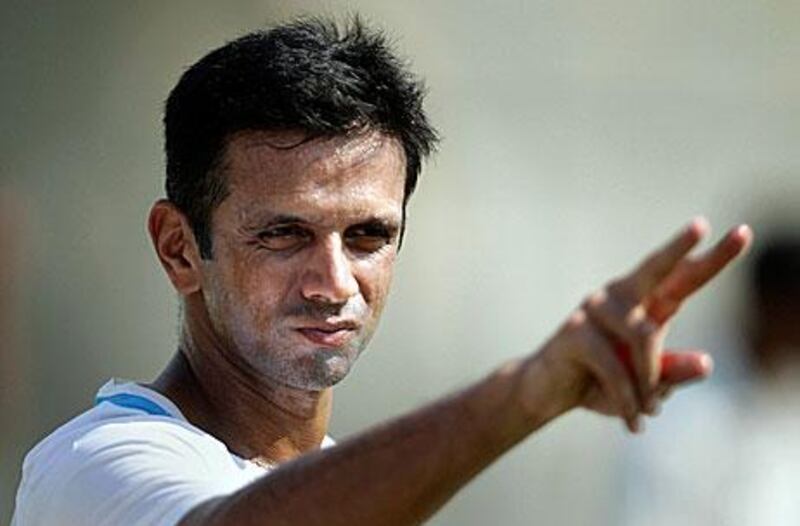Rahul Dravid was rare among elite sportsmen in that he never gave off an aura of invincibility. It was struggle that defined him, and perseverance that made him a great of the game.
"I wish I could play like Tendulkar or Lara," he once said.
It was not an admission of weakness, more an acknowledgement he had done what he did without being gifted with the same strokemaking ability.
A strike rate of 42 runs every 100 balls suggests a dour batsman that specialised in wearing down the opposition. However, Dravid was anything but the defensive "Wall" that he came to be known as. During the course of an illustrious one-day career - he was India's most consistent batsman against the top sides when they reached the World Cup final in 2003 - he scored more than 10,000 runs, including a 22-ball 50.
The style he adopted in Test cricket, where he faced a record 31,258 deliveries, had much to do with the limitations of the Indian side at the time. The man he replaced, Sanjay Manjrekar, had not done justice to his talent despite starting his career with away hundreds against the West Indies and Pakistan.
It was a line-up that relied heavily on Sachin Tendulkar. Dravid's role was to provide the solidity that had been largely absent since the two Mumbai stalwarts, Sunil Gavaskar and Dilip Vengsarkar, retired.
There was something of both men and the Mumbai school of hard knocks in the way that Dravid approached an innings.
Resolute in defence, and equally at ease off front and back foot, he could also drive and cut with real elegance.
His 95 on debut at Lord's was impressive but the first glimpse of the batsman he would become was against a superb South African pace attack at Durban in 1996.
India were skittled for 100 and 66, and Dravid remained unbeaten on 27 in the second innings, batting two hours on a well-grassed pitch when some of his teammates clearly did not fancy the contest.
The impressive numbers tell only part of the story, because even in his prime, Dravid was India's go-to guy. Need a stopgap wicketkeeper to balance the one-day side? No problem. Want someone to open the innings against Shoaib Akhtar in Pakistan? Call the No 3.
Where others refused to budge from their comfort zones, Dravid was always ready to step up.
Of the three hundreds he made during India's disastrous tour of England last year, two came while batting as makeshift opener. At The Oval, he carried his bat for 146 out of a total of 300.
The intensity that made him a great batsman did not always help his captaincy, but a record of eight wins and six losses in a period of great tumult should not be disregarded. His reign included a first series win in the West Indies since 1971 and the only success in England since 1986.
Though the drops became more frequent towards the end of his career, for more than a decade, he was also peerless standing at slip. Some of the catches he took off the spinners, especially Anil Kumble, featured exceptional reflexes and the softest of hands. For most with such an extensive catalogue of achievement, putting together a highlights reel can be tricky.
In Dravid's case, though, there was one match that encapsulated everything you needed to know about his brand of batsmanship. At Adelaide in December 2003, he batted 835 minutes for scores of 233 and 72 not out.
India had conceded 556 and then slipped to 81 for four before Dravid and VVS Laxman transformed the game with a triple-century partnership, just as they had so famously at Eden Gardens two years earlier.
On the final day, he again glued the innings together as India made hard work of chasing down 230.
Such was Steve Waugh's appreciation at the end of the match that he went to the gutter, picked up the ball and presented it to Dravid after the winning runs had been cut through point.
Dravid, who so admired Waugh's flint-hard approach to the game, still considers it one of his proudest moments.
Most of all, though, in an age when athletes are increasingly disconnected from reality, Dravid never lost perspective.
Centuries in the Caribbean, England and on home soil meant that his final season was a memorable one, despite the debacle in Australia. "Good season or not, the time is right to go," he said. "When your body and mind start sending you signs, you know. It's also time for Indian cricket to look forward."
When those who watched India's golden generation achieve unparalleled success look back, however, they might fully appreciate the contributions of a colossus - unassuming, polite, articulate and always aware that the game and the team came before the individual.
Follow us
[ @SprtNationalUAE ]





